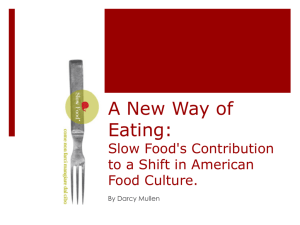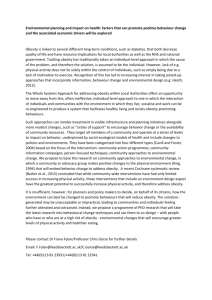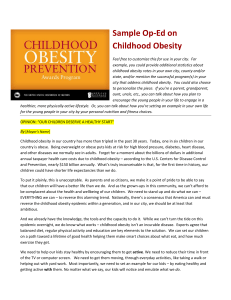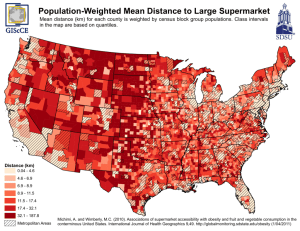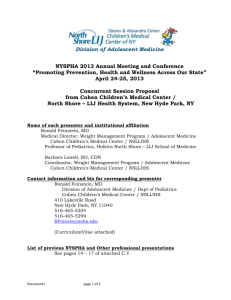ArtEnglish
advertisement
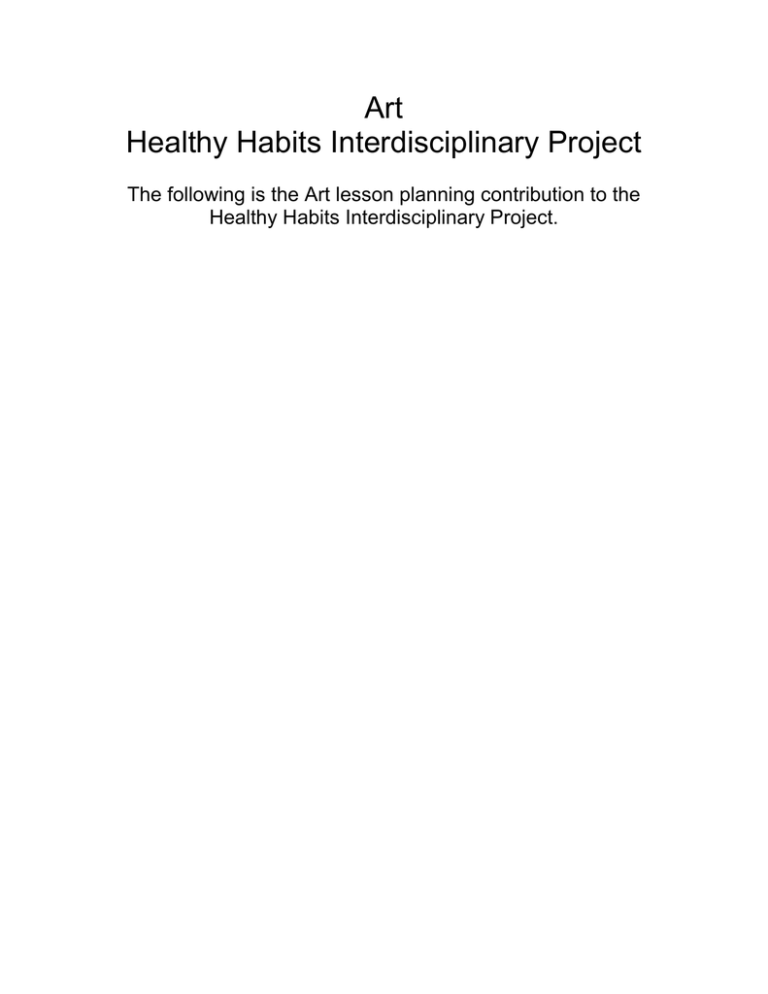
Art Healthy Habits Interdisciplinary Project The following is the Art lesson planning contribution to the Healthy Habits Interdisciplinary Project. Name: Period: PLATE CRITIQUE SHEET What elements and principles of design did you use for your plate? Describe 2 from each category. Elements of Design Principles of Design * Line * Color * Shape (Organic, Geometric) * Texture * Space * Form * Unity * Rhythm (Progressive, Alternating, ) * Point, Line, * Balance (Symmetrical, Asymmetrical, Radial) * Hierarchy * Scale * Dominance * Similarity and Contrast Write your description here: How does your plate illustrate the food issue you selected? English Healthy Habits Interdisciplinary Project The following is the English lesson planning contribution to the Healthy Habits Interdisciplinary Project. Good Food/Bad Food: Healthy Habits Project Pre-Reading & Reading Activities Student Name: ____________________________________________________ Developed by Roberta Ching of ERWC and adapted by Natasha Paul Reading Selections for this unit: Brody, Jane E. “Attacking the Obesity Epidemic by First Figuring Out Its Cause.” New York Times 23 July 2011. Gable, Lawrence. “School Lunches Get Healthier.” What’s Happening in the USA? February 2011. Vol.18. No.6 Web Sites for This Unit: Vocabulary.com www.vocabulary.com READING RHETORICALLY: Prereading Activities (#1-4) Activity 1 Getting Ready to Read -- Quick Write Americans are at increasing risk of disease because of the unhealthy food we eat. What will it take to get us to change our eating habits? Activity 2 Surveying the Text Surveying the texts gives you an overview of what the articles you are going to read are about and how they are put together. This activity will help you create a framework so that you can make predictions and form questions to guide your reading. 1. What do the titles “Attacking the Obesity Epidemic by First Figuring Out Its Cause” and “School Lunches Get Healthier” tell you about what the articles will be about? ____________________________________________________________________________ ____________________________________________________________________________ ____________________________________________________________________________ ____________________________________________________________________________ 2. One of the articles was published by the New York Times in 2011. What can you predict about the article based on the newspaper? ____________________________________________________________________________ ____________________________________________________________________________ ____________________________________________________________________________ ____________________________________________________________________________ Activity 3 Making Predictions -- Anticipation Guide Before reading “Attacking the Obesity Epidemic by First Figuring Out Its Cause” indicate in the first column which of the statements below you believe are true and which are false. After reading, go back and label the statements true or false based on what you learned by reading the article. Record the number of the paragraph in which you found the information. After your class discusses the answers and the evidence, make any needed corrections in the last column Statement Before Reading T or F After Reading T or F Proof Paragraph Correction (only if necessary ) Americans now need far fewer calories to be healthy than people did in the 1800s. Statement Before Reading T or F After Reading T or F Proof Paragraph Correction (only if necessary ) Efforts to reduce smoking show that it’s almost impossible to get people to change habits. Taxing unhealthy food would be an inexpensive way to improve American health. Offering healthy lunches at school means kids are more likely to eat healthy food at home. Activity 4 Surveying The Text: Making Predictions and Asking Questions Read the first paragraph of “School Lunches Get Healthier” silently. 1. What does the writer Gable suggest was wrong with school lunches prior to 2010? ____________________________________________________________________________ ____________________________________________________________________________ ____________________________________________________________________________ ____________________________________________________________________________ ____________________________________________________________________________ Now read the last paragraph silently. 2. Why do you think school lunches are getting healthier? ____________________________________________________________________________ ____________________________________________________________________________ ____________________________________________________________________________ ____________________________________________________________________________ ____________________________________________________________________________ Reading Activities (#5-11) Activity 5 Reading for Understanding The first reading of an essay is intended to help you understand the text and confirm predictions. This step is sometimes called reading “with the grain” or “playing the believing game.” As you read, think about the following questions: 1. Highlighting with a Purpose ● Now you will finish reading the rest of the essay. ● As you read, highlight any main idea phrases or sentences. ● Remember: Main ideas are general statements that highlight the most important ideas in a piece of writing. Main ideas are what the examples, reasons, or evidence help explain or prove. 2. Reviewing Predictions Refer to your predictions in Activity 2-4 1. Which of your predictions turned out to be true? ____________________________________________________________________________ ____________________________________________________________________________ 2. What surprised you? ____________________________________________________________________________ ____________________________________________________________________________ ____________________________________________________________________________ ____________________________________________________________________________ 3. If your predictions turned out to be wrong, what misled you? ____________________________________________________________________________ ____________________________________________________________________________ 4. What, if anything, is still confusing to you? ____________________________________________________________________________ ____________________________________________________________________________ Activity 6 Understanding Key Vocabulary Choose the word that best fills in the blank in the sentences below from the list of key words and phrases. Look back at “Attacking the Obesity Epidemic” to see how the word or phrase is used. The number of the paragraph where the word is used is given in parentheses. If you still cannot figure out the meaning, look it up in a dictionary. Key words: subvert (2); culpable (5); laden (6); crave (11); push factors (13); obesogenic (13); interventions (16); controversial (24) Word (part of speech) Meaning Examples (What it is, Where I see it, What picture comes to mind) Example Sentence 1. subvert (verb) to destroy completely __________________ is so tasty that it subverts our efforts to eat less of it. 2. culpable (adj) deserving blame The television industry is culpable for allowing ads for __________________ on children’s shows. 3. laden (adj.) filled with great quantity A _________________ is laden with enough calories for a whole day. 4. crave (verb) to have an appetite or great desire for something In the middle of the afternoon, the junk food I crave is _______________ . 5. push factors (n) a motivating aspect or condition A _________________ on every corner is a push factor that encourages people to eat more calories than they use. 6. obesogenic (adj) causing obesity I try not to eat obesogenic foods such as ____________________ _ because I know they make me gain weight. 7.interventions (n) care, or treatment, used to improve a situation An intervention that helps people eat more fruits and vegetables is ___________________. 8.controversial (adj) causing dispute Taxing junk food is or controversy Activity 7 controversial because ____________________ _. Quick Write Do you eat healthy lunches when you are at school? Why or Why not? Activity 8 Analyzing SOAPSTone Elements Complete the following SOAPSTone chart noting subject, occasion, audience, purpose, speaker, and tone for Brody’s article. When you are done, check your answers with a partner. Add or revise information as necessary. Text Component Subject What is the subject or topic of the piece? What theme or big idea do you see? What is this piece about? Occasion What event or occasion do you think caused the author to write this piece? Audience To whom is the author writing? How do you know? Purpose What does the author want you to believe or understand? What is the purpose of the text? (choose one): ● To educate or inform (if the author’s position was neutral) ● To persuade or convince (if the author’s position was negative or positive) ● To reflect on an important event or idea (poetry, personal “Attacking the Obesity Epidemic” by Jane E. Brody narrative). Speaker What do we know about the speaker? How does his background affect his point of view on the subject? Tone What is the attitude of the speaker or writer as revealed by the choice of vocabulary? Tone words: academic, formal, informal, sarcastic, humorous, informative, reflective, persuasive, casual, argumentative, passionate, cautionary, condescending, respectful, etc. Activity 9 Annotating and Questioning the Text Annotating the text is a way of making sure you understand the most important parts of a text. The word “annotation” includes the Latin root “not/nota,” which means “to mark or sign.” In this case, you are marking the text. Once you understand it, you can begin to analyze (think about its parts) and interpret (make meaning of it). Annotating the text is also a way to help you with your writing. By identifying and understanding what Brody uses in her essay to make it a strong piece of writing, you will be able to make your own writing more powerful. You will be making marginal notes. For this activity, you will make different notes in the left and right margins. LEFT MARGIN: Understanding Content and Purpose Highlight, underline, and make notes in the margin where you find the following: ● The issue Brody is writing about ● Brody’s main points ● Examples that show how Brody feels about the issue ● Examples of how obesity is a concern for all Americans. ● What Brody wants her readers to do or believe RIGHT MARGIN: Reacting to the Text Highlight, underline, and make notes in the margin where you ● Agree ● Disagree ● Have a question ● Have a comment ● Have any sort of reaction (This might mean feeling surprised, shocked, confused, or interested.) Activity 10 Considering the Structure of the Text: Reread Brody’s “Attacking the Obesity Epidemic by First Figuring Out Its Cause,” and then do the following: 1. Draw a line across the page where the introduction ends. Is it after the first paragraph, or are there more introductory paragraphs? How do you know? 2. Draw a line across the page where the conclusion begins. Is it the last paragraph, or are there several concluding paragraphs? How do you know? 3. Discuss in groups or as a class why the lines were drawn where they were. In this activity, think and reasoning about organizational structure is more important than agreeing on where the lines should be drawn. 4. Further divide the body of the text into sections by topics (what each section is about). Activity 11 $2 Summaries v. Detailed Summaries Sometimes all you need for a summary is to determine the essence of the text and gather the main idea without all the details. Doing this can sometimes be harder than it sounds! ● The teacher will assign you a paragraph from Brody’s “Attacking the Obesity Epidemic by First Figuring Out Its Cause,” to determine the essence of the paragraph in one word or a short phrase. ● After recording the class’s responses, use the shared knowledge to create a $2 summary of the entire article (each word is worth 10 cents). Your Paragraph, # _____ ____________________________________________________________________________ _ Paragraph 1-25 Class Responses: ____________________________________________________________________________ _ ____________________________________________________________________________ _ ____________________________________________________________________________ _ ____________________________________________________________________________ _ ____________________________________________________________________________ _ $2 Summary of Article (20 words or fewer) ____________________________________________________________________________ _ ____________________________________________________________________________ _ ____________________________________________________________________________ _ ____________________________________________________________________________ _ ____________________________________________________________________________ _ Good Food/Bad Food: Healthy Habits Project Post-Reading & Writing Activities Student Name: ____________________________________________________ Developed by Roberta Ching of ERWC and adapted by Natasha Paul Reading Selections for this unit: Brody, Jane E. “Attacking the Obesity Epidemic by First Figuring Out Its Cause.” New York Times 23 July 2011. Gable, Lawrence. “School Lunches Get Healthier.” What’s Happening in the USA? February 2011. Vol.18. No.6 Connecting Reading to Writing Discovering What You Think Activity 12 Quick-Write You have learned and discussed different causes of the obesity epidemic, including unhealthy food available to students in schools and young peoples’ unhealthy eating habits. Young people are at increasing risk of disease because of the unhealthy food we eat. What will it take to get students to change their eating habits? Brainstorm possible ideas to encourage healthier eating at MDHS, and select the one that you feel would have the biggest impact while being practical to implement. Explain why you think your solution will be effective. Solution #1: Solution #2: Solution #3: Activity 13 Getting Ready to Write and Gathering Evidence to Support Your Claims Writing Task: Write a persuasive letter to the principal, proposing how to encourage healthier eating at MDHS. Your letter should address a problem that you have identified. You may want to propose changes to the food that is available to students or ways of educating them to be consumers of healthier food. You should provide evidence for the solution you propose based on the two articles we read, the film and your generations interview. The first portion of the letter will be a summary where you show the principal that you understand the main issues of the obesity epidemic. The second portion of your letter will discuss your proposed solution with evidence or examples of how this could work. Directions: 1st Paragraph: ● Summarize information you have learned about obesity epidemic ● Thesis (What change you want + why) 2nd Paragraph ● Topic Sentence with your solution ● Details of your proposed solution (How and Why) Sample Letter: October 7, 2013 Activity 13 (continued) Dear Ms. Cismowski, Obesity in children is a widespread epidemic and is aggravated by the unhealthy food served in our schools. Schools should provide students with healthier foods because ______________ and ______________. According to an article titled “Attacking the Obesity Epidemic by First Figuring Out Its Cause” published in the New York Times in 2011, (briefly summarize evidence in article) _______________________________________________________________________. One solution to the obesity problem that could make a difference here at Mt. Diablo High School, is ___________________________________________________________________________ _. This solution will work because ____________________________________________________. In conclusion, _____________________________________________________________. Sincerely, Concerned Student (Your Name) Reminders for the letter: ● Address the author as Ms. Brody (NEVER as Jane) ● Use your own words. Do not include quotations or direct sentences from the article. ● Write in third person NOT in first person (no I believe, I think, I feel, etc.) ● Use some of your vocabulary from Activity 6 (subvert, culpable, laden, crave, push factors, obesogenic, interventions, controversial) Evidence You Will Use to Support Your Solution Proposed Solution Evidence/Example #1 Evidence/Example #2 Writing Rhetorically Activity 14 Composing a Draft of Your Letter Referring to the materials you have gathered from your previous work and the directions for the writing assignment, now draft the letter to the principal: Activity 14 Date _________________________ Dear _____________________________ , Paragraph 1 ___________________________________________________________________________ __ ___________________________________________________________________________ __ ___________________________________________________________________________ __ ___________________________________________________________________________ __ ___________________________________________________________________________ __ ___________________________________________________________________________ __ ___________________________________________________________________________ __ Paragraph 2 ___________________________________________________________________________ __ ___________________________________________________________________________ ____ ___________________________________________________________________________ ____ ___________________________________________________________________________ ____ Activity 14 (continued) ___________________________________________________________________________ __ ___________________________________________________________________________ __ Paragraph 3 ___________________________________________________________________________ __ ___________________________________________________________________________ __ ___________________________________________________________________________ __ Closing ___________________________________________________________________________ __ ___________________________________________________________________________ __ ___________________________________________________________________________ ____ ___________________________________________________________________________ ____ ___________________________________________________________________________ ____ ___________________________________________________________________________ ____ ______________________________ , ______________________________ Activity 15 Revising Your Draft Now that you have written a first draft of your letter to the principal, you will type a second draft using Google Docs. Steps: 1. 2. 3. 4. 5. 6. 7. 8. 9. 10. 11. 12. 13. Login to your Digital Safari Gmail Account. Find the black bar at the top of the screen and click on “Drive” Click on the red “Create” button and then click on “Document” Click in the area that reads “Untitled Document” Rename your document to read “_Your Name_Letter to Ms. Cismowski” (example: N.Paul Letter to Ms. Cismowski) Click on the blue “Share” button in the upper right hand corner. Invite your English teacher: a. Ms. Paul -- npaul@digitalsafari.org b. Mr. Castro -- mcastro@digitalsafari.org Click the green “Share and Save” button. Click the blue “Done” button Now type your letter! Remember to check spelling and grammar. Your document will automatically save for you as you type. Logout of your email before your leave today. Healthy Habits DSA Project Generations Interview 15 points Due: Directions: Talk to a person who was born before 1965 (over 50 years old). This can be a family member, family friend, neighbor, or other adult in your life. Ask this person questions about their eating habits as a child and teenager. Write down the responses and summarize the interview in a paragraph. Interview Questions: Name: Age: 1. How many home cooked meals would you say you ate per week growing up (we eat 21 meals a week)? Who cooked? 2. What was a typical: breakfast? lunch? dinner? 3. How much time did you play outside every day? 4. Did both your parents work outside the home? 5. In your experience how has the food we buy at the store and in restaurants (fast food) changed over the years? 6. Do you know there is an obesity epidemic in the U.S.? (1 in 3 children are obese) What do you think has caused this? 7. What do you think the government could do to help Americans become more healthy eaters? 8. What can schools do to help this effort? 9. Additional Question: 10. Additional Question Reflection Paragraph: Reflect on your interview. Summarize the information you collected and make any conclusions you can about food and eating habits in America prior to the 1980s. (You may attach a separate sheet of paper for this.) October 8, 2013 Dear Ms. Cismowski, Obesity in children is a widespread epidemic and is aggravated by the unhealthy foods served in school. School should be providing students with the right nutrients and vitamins. According to an article titled “Attaching the Obesity Epidemic by first figuring out its cause” published in the New York Time in 2011, had evidence that fast foods is very unhealthy for young children, teens, and adults. Obesity is the main problem for americans. The fat and grease for the fast food is unhealthy and fatty for you. One solution to the obesity problem that could make a difference here at Mt. Diablo High School is a salad bar that has fresh fruits and vegetables. This solution will work because instead of students eating junk food or unhealthy snacks they will eat salad or fresh fruit. The salad bar can have fresh fruit and vegetables like bananas, strawberries, watermelon, carrots, broccoli, cauliflower etc. The salad bar is available for all students, it will be free. In conclusion I think we should have a salad bar available at lunch for everyone to eat. Sincerely, Kathy Nguyen Data : Octorber 8,2013 Dear ms.cismowski Obesity in children is a widespread epidemic and is aggravated by unheatly foods served in our schools.School should provide students with healthier foods because obesity and unheatly foods.According to an article titled ‘’Attacking the obesity epidemic by the frist figuring cause published in new york times in 2011.attacking obesity epidemic. one obesity problem that could make a difference here at mt diablo high is the food here mt diablo high.the soultion will work because kids like to eat looks good or taste good they really don’t care about there weight and have food that’s cooked not frozzen foods.They also like to eat hot chetos that has a lot of salt all that fat goes to different parts of your body.In conclusion most kids dont really care what they eat now days so they eat unheathly rathere then heatly foods and there parents also dont care what there kids eat also they just buy food that keeps them fool for the time. Sincerly Joshua Villalobos October 8, 2013 Dear Ms.Cismowski, Obesity in children is a widespread epidemic and is aggravated by the unhealthy food served in our schools. Schools should provide students with healthier meals because the students are adapting unhealthy eating habits and that may cause them to become obese. The problem with these children is that they crave these foods. Stores and television commercials have push factors that persuade people to buy the obesogenic food that are advertized. According to an article titled “Attacking the Obesity Epidemic by First Figuring Out It’s Cause” published in the New York Times in 2011, the change in obesity in America children throughout the years. One solution to the obesity problem that could make a difference here at Mount Diablo High School, is to stop selling obesogenic like hot cheetos, pizza, cheese zombies, slushies, and other snacks similar to the ones listed. This solution will work because without the junk food, hungry students will have no choice but to buy healthier options to eat. In conclusion, this school needs to provide healthier food options while eliminating and educating junk food and it’s cons in order to stop obesity from spreading across our school. Thank you for your time, I do hope that you consider my proposition and thank you for reading this. Sincerely, Digital Safari Student, Katherine Banuelos October 8, 2013 Dear Ms. Cismowski, Obesity in children is a widespread epidemic and is aggravated by the lack of exercise opportunities and unhealthy snacks provided here at the school. Schools should provide students with more ways to stay fit and eat healthier snacks so healthy habits develop and they can live a long, disease free life. According to an article titled “Attacking the Obesity Epidemic by First Figuring Out Its Cause” published in the New York Times in 2011, obesity has developed over the years and is now a nationwide problem due to unhealthy foods and little to no exercise. One solution to the obesity problem that could make a difference here at Mt.Diablo High School, is to have a physical fitness field carnival day at least once a semester. This solution will work because it promotes eating right and being active. Food stands will be scattered around the field serving nutritious,easy to make, yet delicious snacks. In this way students will learn to crave better foods. All other stands will be hosting fun activities in which the student can exercise and have fun without the need of electronics. In conclusion, by promoting healthier eating and exercise habits here at Mt.Diablo High School, it could subvert the ongoing obesity epidemic. Thank you for your time and consideration. Sincerely, Concerned Student Elisa Gomez October 8, 2013 Dear Ms. Cismowski, Obesity in children is a widespread epidemic and is aggravated by the unhealthy food served in our schools. Schools should provide students with healthier food because students are getting unhealthy and unfit. some children are developing diseases still as young children. children eating all this obesogenic food “will keep getting bigger and implode.” According to an article titled “Attacking the obesity epidemic by first figuring out the cause” published in the new york times states that children of this generation are a lot more unhealthy compared to the generation of the say the 1950s . Since then the obesity rates have gone up alot and kids and adults are going to keep getting more unhealthy over the next 50 years, but we can help keep our students from getting diseases in older ages by giving them healthy food now. One solution to the obesity problem that could make a difference at Mount Diablo High School is, we could serve fresher fruits and vegetables in our cafeteria and snack houses. i believe this solution would work because kids will be eating and possibly start losing weight and/or maintain a healthy weight. in conclusion i believe we should serve healthier, fresher food and meals in our cafeteria and in our schools Sincerely,Concerned student Dalton Tolen October 8, 2013 Dear Ms. Cismowski, The obesity epidemic has been increasing and the unhealthy food in the school is a reason why. Schools need to provide healthier foods because it will help maintain their weight and help with eating habits around school, at home, and outside of school. In the article it states that most kids were always active back in the day. A solution to the obesity problem that can help here at Mount Diablo High School is to sell more healthy snacks at lunch. The school can also have less obesogenic food for sale on certain days so the students would want the healthier ones. The solution will work because people won’t crave as much junk food as before. In conclusion it would be smart to change the snacks that are sold. This change can help students eat healthier snacks and get healthier eating habits. Sincerely, Jose Padilla

